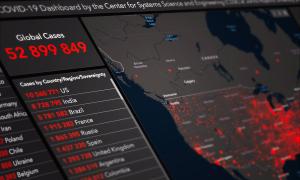IrsiCaixa develops a website to monitor SARS-CoV-2 variants in Spain

The CovidTag website, designed by IrsiCaixa, is open to the public and allows to view the frequency of the latest variants of SARS-CoV-2 in all Spanish autonomous communities, as well as quantify the total number of samples sequenced by territory.
A good control of the pandemic requires a thorough review of the prevalence of the different variants of SARS-CoV-2. To achieve this, the IrsiCaixa AIDS Research Institute, a center jointly promoted by "la Caixa" Foundation and the Department of Health of the Generalitat de Catalunya, has created a new website that provides a detailed overview of how SARS-CoV-2 variants are evolving in the different Spanish autonomous communities. The tool, called CovidTag, is accessible to everyone and allows to obtain the total number of sequenced samples in each region. The weekly update of the information is possible thanks to the GISAID database, a platform that offers global genomic data related to SARS-CoV-2.
"Since the beginning of the pandemic until now, more than 20,000 samples of SARS-CoV-2 have been sequenced in Spain," explains Marc Noguera-Julian, associated researcher at IrsiCaixa and co-creator of CovidTag, "The aim of this new website is to share the current situation of the pandemic in Spain, making a geographical monitoring of the different variants that are appearing," he adds.
SARS-CoV-2 variants, community by community
CovidTag stands out for allowing the user to compare the evolution of SARS-CoV-2 variants among the different Spanish autonomous communities, as well as to contrast the situation of a specific community with that of the State in general. The comparison is possible thanks to graphs showing the prevalence of the different variants in each region over time (Figure 1). The data, which come from the GISAID database, are updated weekly and this allows CovidTag to provide a current picture of the pandemic situation in the country.
"The number of sequenced samples can be very different between autonomous communities, and this must be kept in mind when interpreting the frequencies of the variants in each region," says Francesc Català, data engineer at IrsiCaixa and co-creator of CovidTag, "Thus, the more samples an autonomous community has sequenced, the more representative the prevalence of each variant in that territory will be," he explains. In fact, compared to the beginning of the pandemic, there has been an increase in the number of SARS-CoV-2 genomes sequenced in Spain.
Thanks to this new tool developed by IrsiCaixa researchers, it is possible to see how the new variants that are appearing are displacing the previous ones. Currently, for example, we can see how the B.1.177 variant (according to the PANGO lineages nomenclature), which was the predominant variant in Spain throughout 2020, is losing presence in favor of the B.1.1.7 variant, known as the "British variant". On the other hand, it can also be observed that Navarra is the autonomous community that is sequencing more samples per inhabitant, and Catalonia is the region with more total samples sequenced than any other region in Spain (Figure 2).
Anticipation and more effective containment measures
Thanks to its information, CovidTag becomes a potentially useful tool not only for healthcare personnel and researchers when implementing prevention strategies and designing studies, respectively, but also for the general population interested in keeping up to date with SARS-CoV-2.
"One of the things that this pandemic has taught us is the need to take early restriction measures in order to keep the virus at bay and avoid as much as possible the appearance of new variants," says Roger Paredes, principal investigator at IrsiCaixa. "Tools such as CovidTag are essential to implement containment actions in advance, because thanks to them we can make informed decisions and prevent the emergence of new variants or the expansion of existing ones," he concludes.